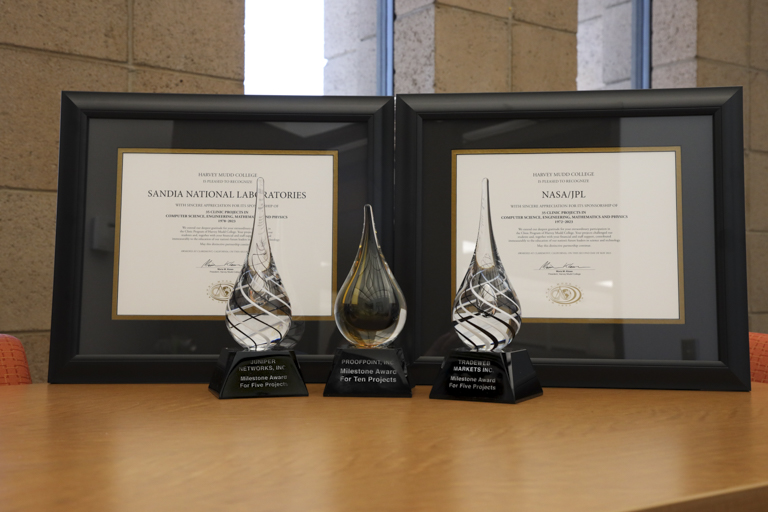Harvey Mudd Presents 2023 Clinic Program Milestone Awards
May 3, 2023
Five organizations are being honored by Harvey Mudd College for participating in its Clinic Program and for investing in its students and the future of science, technology, engineering and mathematics.
Honorees NASA, Sandia National Laboratories, Proofpoint, Juniper Networks and Tradeweb are sponsors of the Clinic Program, an internationally recognized hallmark of Harvey Mudd College that engages juniors and seniors in the solution of real-world, technical problems for industrial clients. Each year, more than 40 organizations, many with HMC alumni employees who support the Clinic Program as liaisons and advisors, work with approximately 250 students to develop solutions to business challenges and push forward the industry standard in research and development or build a working prototype. The business value of the Clinic outcomes often leads sponsors to return.
The College celebrates returning Clinic sponsors with the Milestone Award.
35 Projects
National Aeronautics and Space Administration (NASA) has been a Clinic Program sponsor since 1972, challenging student teams with projects related to space exploration. As Mars exploration expands, JPL and NASA are seeking to bring materials from Mars to Earth, an exercise with potential risks. This year’s Engineering Clinic team built a “safety case” that diagnoses the severity of a range of possible threats to Earth from any returned samples.
Sandia National Laboratories, a Federally Funded Research and Development Center and a contractor for the U.S. Department of Energy’s National Nuclear Security Administration, is a premier science and engineering laboratory for national security and technology innovation. The lab is researching barium titanate (BTO), a ceramic material with many applications in electronics due to its ferroelectric properties. Members of the Engineering Clinic team used density functional theory to perform a computational study on BTO and its interaction with ligands, such as hydrogen, water and tert-butylphosphonic acid. Specifically, they explored the interactions on the titanium dioxide-terminated surface of BTO and explained the effect on the ferroelectric properties of the material.
10 Projects
During its 11 years as a Clinic sponsor, Proofpoint has provided teams with problems relating to predicting and defending against malicious online attacks. The company uses natural language processing systems to classify and filter out malicious or fraudulent emails. This year, the Computer Science Clinic team sought to improve existing tools to test the ways in which malicious content can evade Proofpoint’s models while remaining human-readable. They also researched attacks that switch between multiple languages to confuse language models and defenses against these attacks.
Five Projects
An industry leader in computer networking, Juniper Networks is invested in ensuring the trust in and health of the internet. Computer Science Clinic team members investigated the weaknesses of Border Gateway Protocol (BGP), a crucial component of the internet routing process whose security is essential to the integrity of the internet. They studied the barriers that have prevented the widespread adoption of the security measure BGP-sec, like computational cost and lack of peer adoption.
Tradeweb is a leading global operator of electronic marketplaces for rates, credit, equities and money markets. Advanced technologies developed by Tradeweb enhance price discovery, order execution and trade workflows while allowing for greater scale and helping to reduce risks in client trading operations. Sweep is a Tradeweb platform that facilitates dealer-to-dealer trade in the wholesale, fixed-income marketplace. This year’s Computer Science Clinic team sought to understand the current matching engine and design new algorithms to make optimizations to improve matching results. They focused on individual trader happiness, while still aiming to maximize the volume of trade.
HMC Clinic Program
Under the guidance of a faculty advisor and a company liaison, students work in teams of four or five to develop solutions to unsolved problems presented by sponsoring organizations. Applying their learning in creative ways, HMC students then present their solutions. Companies retain all intellectual property rights that arise out of the project, and it is not uncommon for HMC students to be named on patents. During the 2022–2023 academic year, students undertook 41 Clinic projects related to engineering, computer science, mathematics and physics. Several projects also have a social justice or international (Global Clinic) focus. Since 1963, Harvey Mudd students have tackled challenging problems in nearly 1,700 Clinic projects for more than 500 clients, many of them Fortune 1000 companies. Clinic has been expanded to other HMC academic departments and copied by institutions worldwide. The National Academy of Engineering recognized the program and three HMC faculty members—Clive L. Dym, M. Mack Gilkeson and J. Richard Phillips—with the 2012 Bernard M. Gordon Prize for Innovation in Engineering and Technology Education “for creating and disseminating innovations in undergraduate engineering design education to develop engineering leaders.”
